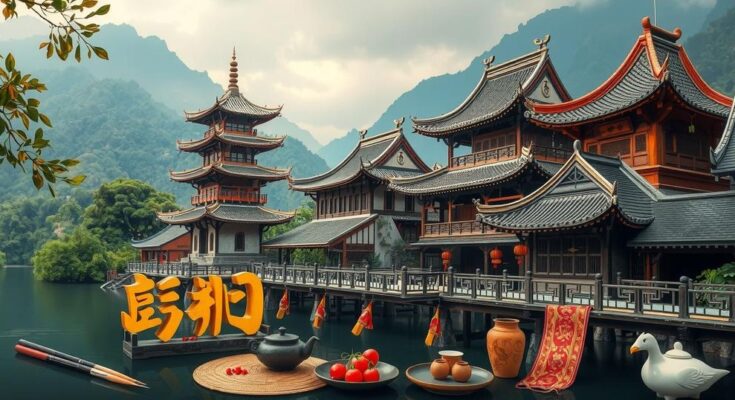In a picturesque autumn setting, expats participated in a cultural event in Qingpu, Shanghai, where they explored local traditions, tasted authentic dishes, and engaged with the rich intangible cultural heritage. Organized by local authorities, the event showcased culinary delights and communal practices, fostering connections between international visitors and the vibrant local culture.
As autumn settles in Linjia Village within Qingpu District, the air is rich with the scent of rice and the soft rustle of paulownia leaves. Golden rice fields stretch endlessly, creating a stunning backdrop that welcomes visitors. Amidst this beauty, various booths showcasing Qingpu’s intangible cultural heritage drew many to experience a delightful afternoon filled with interactive activities. On a serene Saturday afternoon, a group of around 10 expatriates from diverse countries including Canada, Russia, Argentina, and Spain gathered in Zhujiajiao Town for an event titled “Heritage and Sharing – Revealing the Charm of Qingpu’s Intangible Cultural Heritage to the World.” This engaging celebration of Chinese traditional culture was coordinated by the Qingpu District Government Information Office, the District Culture and Tourism Bureau, and City News Service (CNS), a Shanghai-based information platform. Qingpu stands out for its rich cultural history and array of intangible heritage. The eager expats sampled local delicacies that encapsulated Qingpu’s culinary heritage, such as Handalong pickles, Zhao’s dried bean curd, roasted green soybeans, and zharou, a straw-wrapped pork dish. They also joined locals in crafting zhuanggao, a glutinous rice cake, and brewing ‘apo’ tea, fully immersing themselves in the authentic rural life of Shanghai. Established in 1886, the Handalong Sauce and Pickle Shop is a landmark in Zhujiajiao, attracting visitors with its historical significance. Known for its high-quality craftsmanship, Zhao’s dried bean curd from Jinze Town is a local favorite, admired for its delightful combination of tenderness and chewiness. The region’s Liantang rice cake, inherently tied to local festivals, is both a culinary treat and a symbol of good fortune. In the Shangta area of Jinze, the tradition of ‘apo’ tea thrives. Here, elderly women gather daily, sharing tasty homemade specialties like pickled vegetables while enjoying tea and companionship in a warm, inviting atmosphere. This communal spirit adds depth to the intangible cultural heritage uniquely expressed through food and social rituals. The expats also discovered the artistry of tubu (homespun cloth), which, contrary to its humble roots, embodies cultural significance through innovative weaving practices found in suburban Shanghai and surrounding Jiangsu. Engaging in traditional exercises like Baduanjin and exploring woodcut painting truly enriched their experience of Qingpu’s vibrant culture. As evening descended, the melodic strains of tianshange, enchanting folk songs sung by farmers in the fields, filled the air. A communal feast was laid out, stimulating the senses of foreign guests. This blend of fresh ingredients, scenic rice paddies, and the music of tianshange created a joyful celebration of Qingpu’s cultural heritage. “It is the first time I visited Qingpu, I’m really impressed and the people are really kind and very nice and all the activities really make me very happy,” expressed Jorgina Tejera from Canada. “Even though it was raining, we really had a wonderful time to meet people from different countries and to enjoy the Chinese tradition.” Talchuk Hanna from Belarus, a newcomer to Shanghai, expressed her feelings of belonging: “I’m alone here, but this place especially the food makes me feel like I’m at home, and like it’s my family where people care about me.” She emphasized that Shanghai is rich in cultural experiences beyond its famous skyline. As a key venue for the China International Import Expo, Qingpu District attracts increasing foreign interest for investment and lifestyle changes. This event served as a platform to showcase Qingpu’s intangible cultural legacies to overseas guests, inviting them to discover the charm and tradition that define this unique area of China.
This article highlights an event in Qingpu District that introduces foreign visitors to the area’s rich intangible cultural heritage. By participating in traditional culinary activities and communal experiences, expatriates from various countries engaged with local culture. The event aims to promote Qingpu’s historical legacy and attract more foreign interest as it prepares for the China International Import Expo.
The event in Qingpu illustrates the area’s commitment to sharing its rich cultural heritage with the world through engaging activities. Expats enjoyed traditional foods, learned about local customs, and connected with the community, enhancing their cultural appreciation. As Qingpu continues attracting international attention, initiatives like this play a crucial role in celebrating and preserving its unique traditions.
Original Source: www.shine.cn



